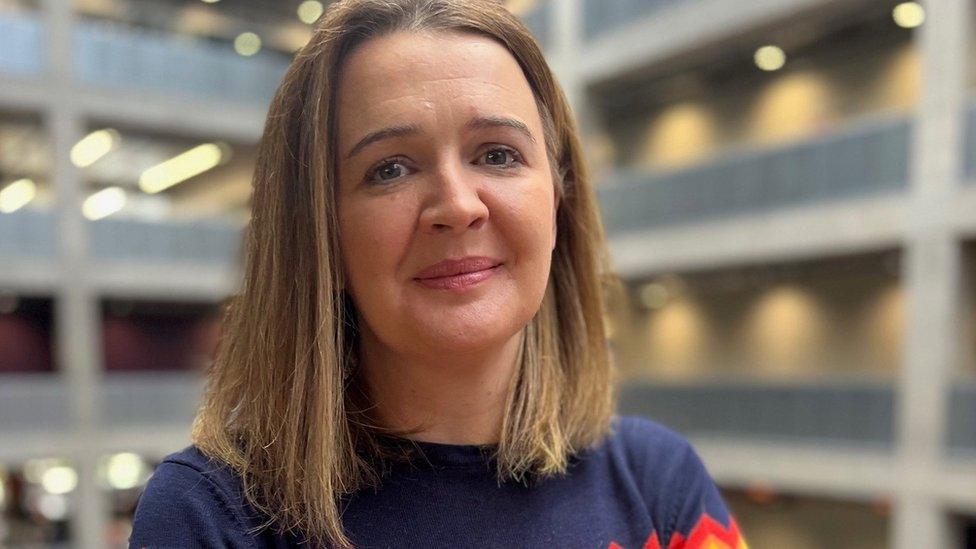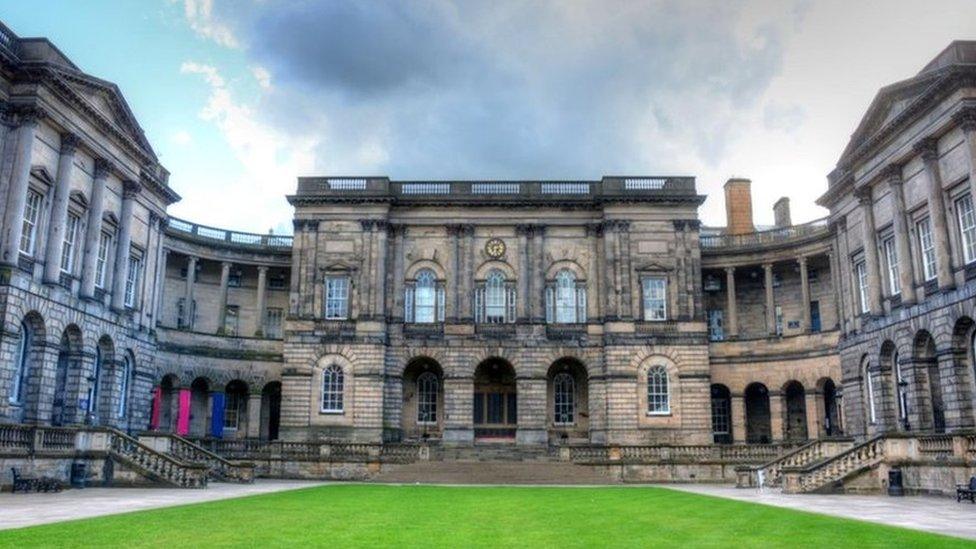I'll still be paying my student loan off at 60
- Published

Vonnie Sandlan took out a series of student loans to fund her studies and living costs
Scottish graduates are seeing their student loan debt rising at a rate of 6.25% a year. For many, that's a higher rate than they would pay for a mortgage.
The rate has risen rapidly over the past year or so, in response to the high cost of borrowing and high inflation.
The soaring rate will not mean graduates have to pay more each month but it could affect how long it will take for many to repay that debt.
Some fear they will reach retirement age without fully repaying costs incurred in their teens and 20s.
'I just don't think I'll ever be able to pay it off'
Vonnie Sandlan went to Glasgow Caledonian University in 2002 to study Social Sciences.
After graduating she got a job but did a second stint as a student at the University of the West of Scotland.
She trained to be an early years school teacher and also became president of the National Union of Students in Scotland.
Ms Sandlan took out a series of student loans to fund her studies and living costs.
She is now 41, and still has £35,000 in student loan debt.
"I earn a decent wage but I'm still not paying enough for my student loan contributions to make an impact on that debt and bring it down," she says.
"I just don't think I'll ever be able to pay it off before I finish working. That's the reality of it."

Graduates in Scotland are paying 6.25% interest on their student loan debt
Vonnie is a homeowner so she is now paying a mortgage - but the interest on that debt is currently 3.69%. The rate of interest on her student loan debt is 6.25%.
"We need to see that interest rate coming down, 6% is just absolutely ridiculous," she says.
"The notion I'm still going to be still paying it off at 60 is quite uncomfortable, to be honest."
Student loans in Scotland are written off at age 65 or at 30 years after someone became eligible to repay.
No tuition fees
Scottish students studying in Scotland do not normally pay tuition fees for university, saving them thousands of pounds of debt each year when compared with other UK nations.
However, they can pay tuition for some further courses and often take out support loans through SAAS (the Students Awards Agency Scotland).
Ms Sandlan says: "I feel very fortunate I've been able to take advantage of university education which supported me to get a good job and pays me well. It allows me to support my family.
"But I do think a 6% interest rate on that student debt just feels excessive and unfair. And I hope the government reflects on this."
She says the government could make the choice to reduce the interest rates and adjust the terms and conditions of student debt so it is fairer and more equitable.
How the interest rate is set
The interest rate on student loans in Scotland is set on the lower of two things. One is the retail price index - the RPI measure of inflation - and the other is the Bank of England base rate, plus 1%.
So as the Bank of England base rate has gone up to 5.25% in the last couple of years, students would have seen the interest on their loans increase.
Graduates in Scotland begin to pay back their student loans when they earn more than £27,660.
They repay 9% of anything they earn over that threshold.
The amount comes directly out of their wages - which means it is not dependant on the amount they have borrowed.
So if a graduate earns £35,000, they would be eligible to repay 9% of £7,340, which is £660 a year (for maths students, here's the sum: £35,000 - £27,660 = £7,340 x 9% = £660 a year - or £55 a month).
But the rate of interest on what they owe is now 6.25% a year.
That means it's harder to clear the initial debt.
The average student loan debt upon entry to repayment is £15,430. Interest on that amount would accumulate at about £80 a month.
Financial author Iona Bain says the higher rate of interest comes at a bad time for current graduates.
"The student loan interest rate rise could not come at a more unfortunate time for a generation of graduates who have only ever known low interest rates on their borrowing," she says.
"Many graduates coming in to their 30s will be looking to buy property, to settle down, to start families and yet the cost of doing all those things is rising tremendously.
"Lots of people will be wishing the rate was back down at those rates of 1% that we saw a few years ago."
Ms Bain added: "When the system was devised interest rates had gone down to incredibly low level, for well over a decade graduates were paying low rates."
Raise the Payment Threshold?
Kate Ogden, senior research economist at the Institute for Fiscal Studies think-tank, said: "The interest rate on student loans in Scotland was less than 2% throughout the 2010s, so this rise to 6.25% may be a shock to Scottish graduates.
"What it won't mean though is anybody repaying more each month.
"The way loans are repaid means that how much you repay depends on your earnings and not directly on the interest rate - unlike with a mortgage - so this won't be hitting students in the pocket now."
Ms Ogden added: "The student loan system's designed to make sure a majority of students will pay back their debt - which protects the Scottish taxpayer - but also that no graduates are faced with unaffordable repayments.
"Now, despite the high interest rates, I still think the system will continue to do this."
She said she expected the interest rate to fall next year so it would no longer be at its historic high.
"If the government is really concerned about protecting students at this point in time and making sure that none of them are put in a difficult financial situation because of these loans, the most effective thing it could do is to think about the earnings threshold, above which students start to make repayments," Ms Ogden says.
"Any increase in that threshold would have an immediate impact on the repayments that students make now."
'Taking strong action'
A Scottish government spokesperson said: "The Scottish government is taking strong action to help students through the cost of living crisis.
"Scotland has the lowest student debt levels in the UK as a result of free tuition for Scottish-domiciled students studying at university here, which ensures they do not incur additional debt of up to £27,750.
"The average debt for students in England is now £44,940, which is almost three times the level of Scotland. Scottish borrowers are also charged lower interest rates than most borrowers from the rest of the UK, where interest on student loans is as high as 7.3%.
"We have also increased higher education student support packages by £900 for 2023-24.
"This raises support for students who may be disadvantaged, including Care Experienced, estranged students and those from the lowest household incomes from £8,100 to £9,000 as the next step in our commitment to providing a package of support equivalent to the living wage."
Related topics
- Published12 January 2023

- Published21 January 2020

